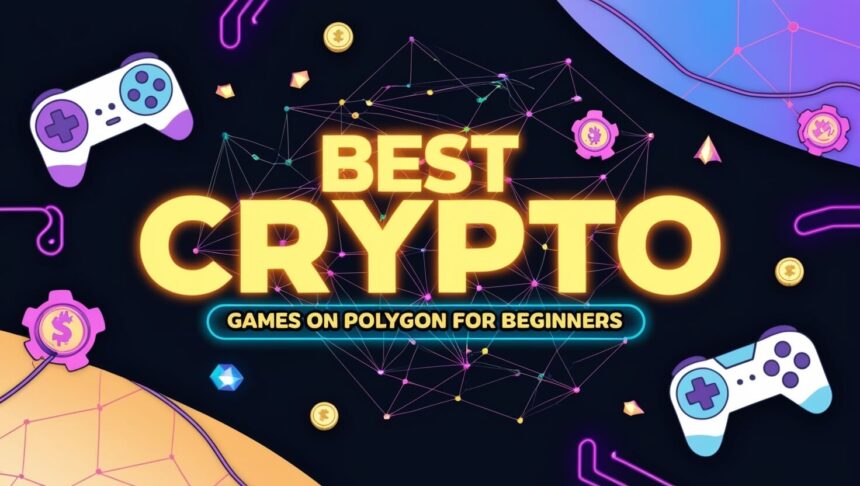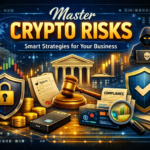I will talk about Best Crypto Games on Polygon for Beginners. Polygon’s speedy and low-cost blockchain is great for novice players wanting to explore crypto gaming.
I will focus on enjoyable games that are simple to master and provide earning opportunities, NFT trading, and engaging experiences. From farming and racing to virtual worlds, everyone will find something great that suits their preferences.
Key Point & Best Crypto Games on Polygon for Beginners
| Game | Key Point |
|---|---|
| Aavegotchi | Combines NFTs and DeFi, allowing players to collect and interact with ghost-like creatures. |
| My Neighbor Alice | A social multiplayer builder game focused on virtual land, farming, and trading. |
| Sunflower Land | A farming and resource management game where players earn rewards by growing crops and raising animals. |
| Decentraland | A virtual world allowing players to buy, sell, and build on virtual real estate. |
| Zed Run | A digital horse racing game where players buy, breed, and race horses to earn rewards. |
| PolkaFantasy | A collectible card game where players battle using NFT cards in a fantasy universe. |
| CryptoMines | A sci-fi mining game where players explore planets and mine resources to earn rewards. |
| Gods Unchained | A blockchain-based collectible card game with easy-to-learn mechanics and competitive play. |
| Sorare | A fantasy football game where players trade and manage player cards to earn crypto. |
| The Sandbox | A virtual world for creating, owning, and monetizing user-generated gaming experiences. |
1. Aavegotchi
Aavegotchi unifies a pet-care Tamagotchi simulation and DeFi NFT systems into a single, battling-game ecosystem hosted on the Polygon blockchain. Players purchase Aavegotchi NFTs, which are ghostly avatars containing aTokens of Aave Protocol, and interact with them in elaborate metaverses known as Gotchiverse through staking, trading, and mini-games.
Aavegotchi’s freemium model makes it accessible for new users; they can join free-to-play modes like Spirit Force Arena or purchase cheap Aavegotchis (some obtainable for mere dollars worth of GHST tokens).
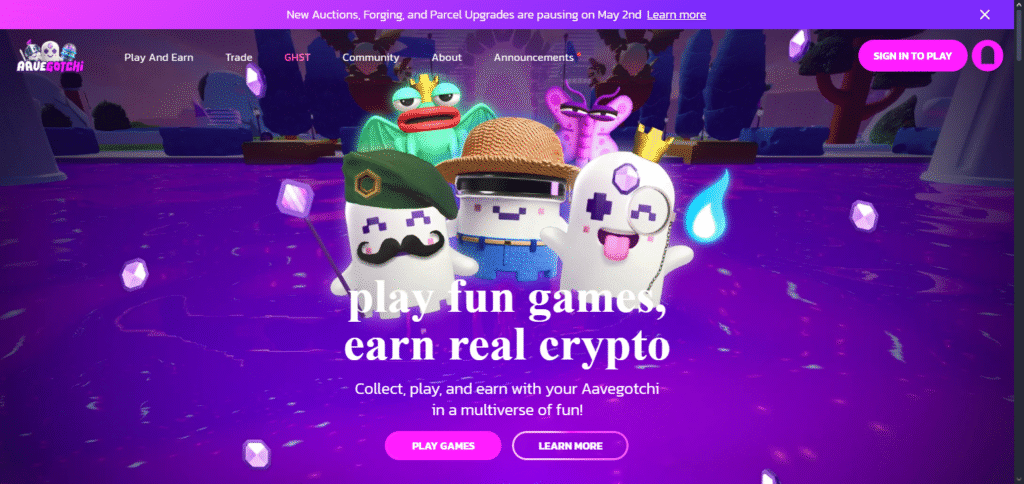
To add to this, the game possesses an intuitive interface, regular community events, and earning streams through rarity farming or mini-game achievements. Cost-effective gameplay is enhanced by low fees on the Polygon network.
The game’s vibrant community also provides ample resources for player onboarding. This blend of straightforward mechanics within an easy-to-grasp DeFi environment on Polygon’s infrastructure makes Aavegotchi incredibly appealing to novices, thus meriting its placement on this list.
Aavegotchi Features
- Creatures in NFT form: Unique, ghost-like creatures known as Aavegotchis are collected by players, and all have distinct Aavegotchi Traits.
- Integration in DeFi: Strategy is added by Aavegotchis interacting with decentralized finance protocols.
- Mini Games: Players can earn rewards as well as improve their Aavegotchis by participating in the mini-games.
- Rewards & Staking: By participating in the DeFi ecosystem, players can earn tokens by staking Aavegotchis.
2. My Neighbor Alice
A racing title inspired by Animal Crossing, My Neighbor Alice is a multiplayer builder game hosted on Polygon where users virtually own islands which they can farm, fish, and exchange NFTs like land, territory, cosmetics, and crops.
Its casual gameplay design is targeted at novice users since the game comes with daily quests which players can tackle to earn money by staking ALICE tokens or selling NFT assets.
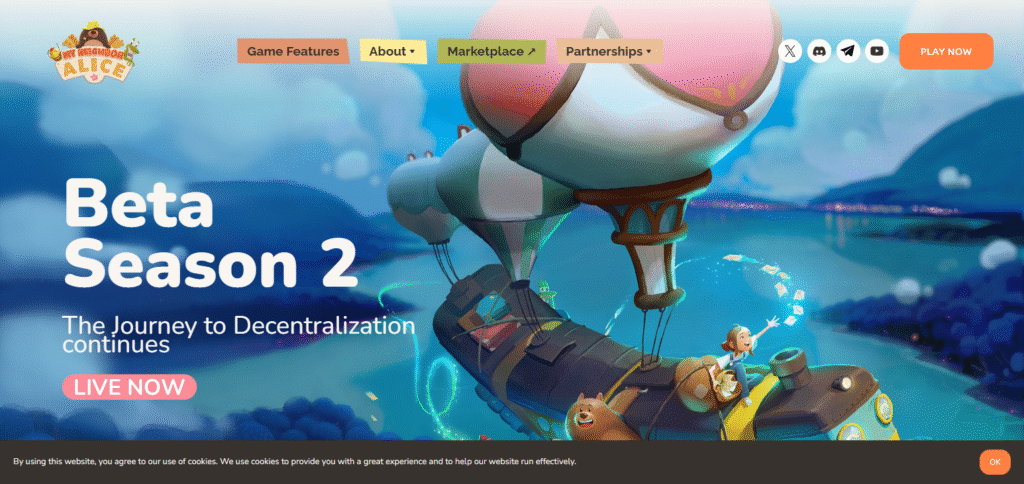
Starting out is quite easy: novice users can explore basic features of the game without payment, however, land ownership (which costs from tens to hundreds of dollars in ALICE) allows users to maximize earning potential.
The low gas fees in Polygon blockchain translate to better transaction economics. My Neighbor Alice’s intuitive game design that walks users through the very basics of the game and the existence of a supportive community reduce the burden of the steep learning curve.
Users can earn through participating in specific activities of the game but earning user-generated content can be far more lucrative.
As Polygon’s native title that boasts regular updates throughout 2025, My Neighbor Alice is positioned as beginner friendly, even as the price of virtual land may turn off some users. The title gets credit for engaging users at a low entry point thereby justifying its position on the list.
My Neighbor Alice Features
- Ownership of virtual land: Players locate in a fun and social setting where they can buy and earn to own virtual land.
- Farming and Animals: Provide an enjoyable environment where players can farm, raise livestock, and trade resources.
- Multiplayer Interaction: The players can engage with one another through social and trade collaboration activities.
- Marketplace for NFTs: Virtual assets include land and livestock which are tradeable as NFTs for crypto earnings.
3. Sunflower Land
Believed to be the crypto equivalent of the renowned “Stardew Valley,” Sunflower Land is a farming simulator that is free to play. In the game, players plant crops, craft products, and trade resources all as NFTs.
As is the case with any new game, learners will seek out and appreciate the low-cost entry, which for Sunflower Land is only 10 MATIC (partially donated to charity). This makes it one of the most accessible games on Polygon.
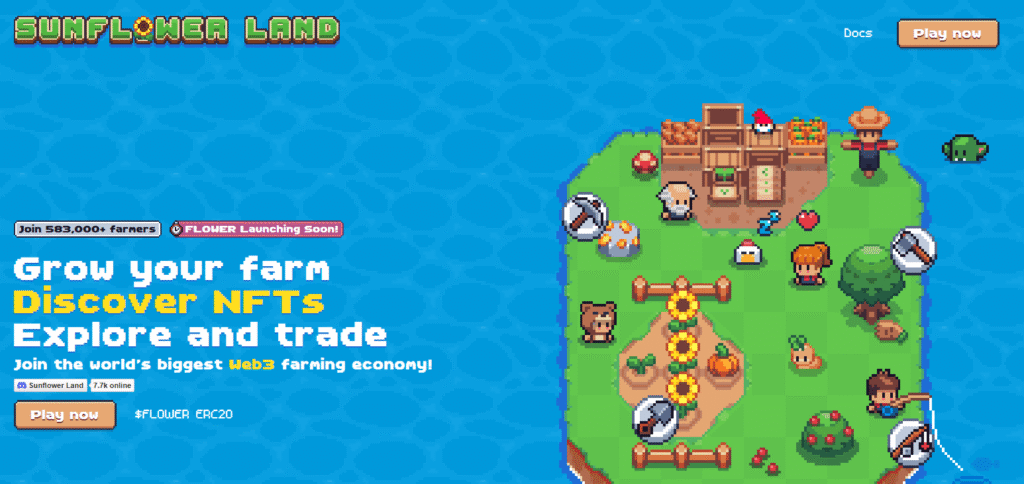
Users can expand community access or purchase a Gold Pass for advanced features, with earnings possible through selling NFT crops or participating in leaderboards. The solar-system-inspired aesthetics and simplistic mechanics paired with the game’s DIY pixel art make for a good welcoming vibe alongside the community of over 220,000 players.
Sunflower Land enjoys ecosystems scalability since it allows smooth and low-cost transactions which is ideal for farming actions. Upgrades like new Sunflower Land crops or new quests coming in 2025 keep the game feel fresh.
The lack of hurdles within and the ease of gameplay and its predictive design around Polygon put Sunflower Land at the spot for highly beginners, making them an undeniable choice to include on the list.
Sunflower Land Features
- Simulations of farming: Players are able to raise and grow crops, as well as harvest animals.
- Management of resources: Players can maximize profits and earn crypto by managing the crops, land, and livestock.
- In Game Marketplaces: Players have the ability to trade crops and animals, as well as other assets in an NFT.
- Simple mechanics: This is a game for everyone because it is free and easy to play. The players who are just starting out will have a very good time in this casual beginner-friendly game.
4. Decentraland
Decentraland is a virtual reality metaverse that allows players to purchase, develop, and monetize virtual land (called LAND), using MANA tokens which are primarily based on the Ethereum blockchain.
While some NFT minting and transaction fee reduction is done through Polygon, the core infrastructure of decentraland remains Ethereum-based land raising questions about its classification as a polygon game.
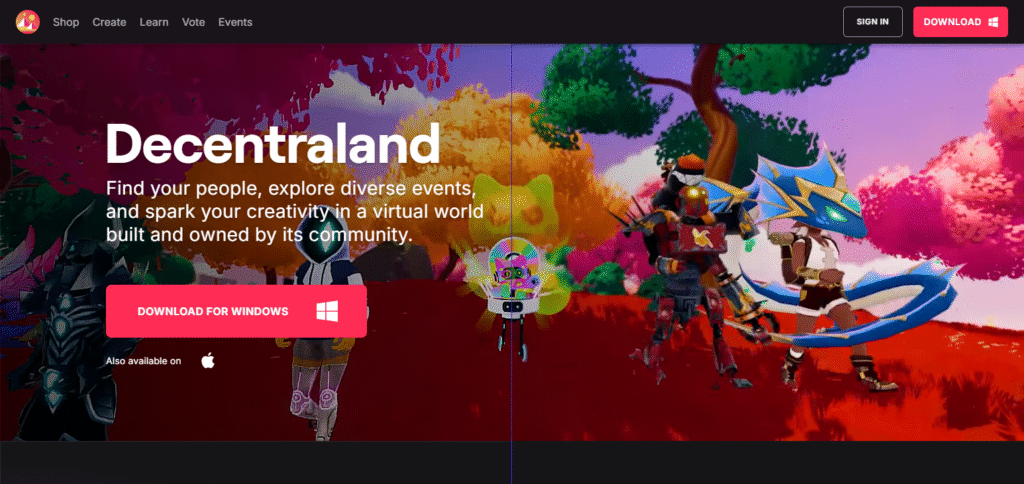
For novices, both the high entry costs and steep learning curve make content creation and hosting events on Decentraland harder for beginners. Free exploration is enabled, but earning in the game requires a significant investment in land or other assets, which greatly limits the opportunity for new players.
The value proposition for players is the unparalleled creativity in an open-world game like hosting concerts and galleries, but the role of polygon is minor, serving only as a medium for marketplace transaction. Decentraland is still popular in 2025, however, its focus on Ethereum and barriers restrict considering it for a Polygon-focused beginner list.
Decentraland Features
- Virtual real estate: The players have the ability to both purchase and sell, as well as develop and cultivate land, all in a virtual space, via the medium of NFTs.
- Exploration: Users can virtually visit various places to see both infrastructure and social activities.
- Building and customization: People can erect constructions and design custom places of interest on their property in virtual worlds.
- Social and interactive: This allows users to interact with one another as people from all over the globe and as avatars in a fully decentralized virtual world.
5. Zed Run
Zed Run is a racing game hosted on the Polygon network where players can buy, breed, and race NFT horses. The logic is simple: buy a horse, race it, and win. This makes it fairly friendly for new users (some horses will sell for $13 in 2025), and return on investment requires winning races and/or breeding high-value and competitive offspring.
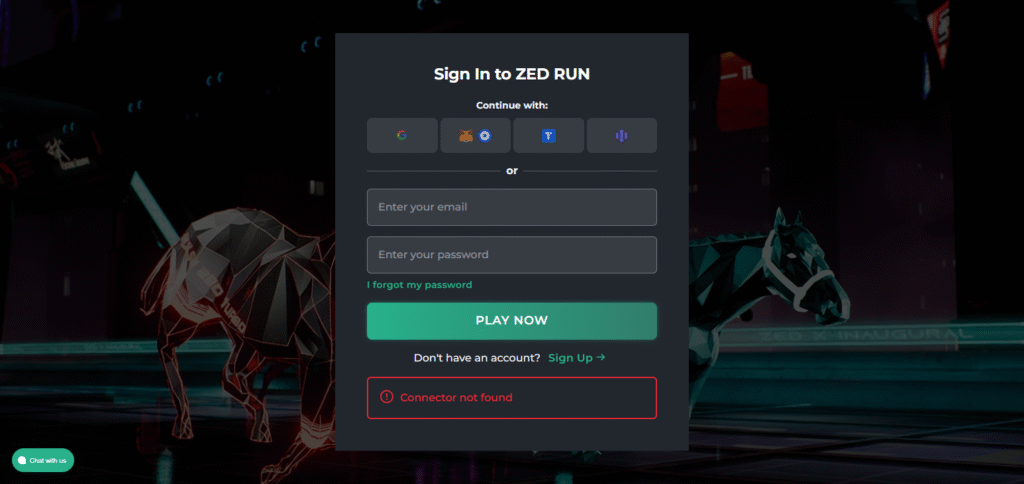
However, the investment strategy required to maintain a competitive stable offers some challenge. Polygon’s low fee structure allows for cheap racing and trading, and the game’s interface, complete with tutorials, user-friendly navigational elements, and community tournaments, makes it easy for new players to pick things up.
Zed Run stays relevant with ongoing changes such as new race types, developed in collaboration with other franchises.
While he doesn’t have the ease of access as free to play titles like Sunflower Land, Zed Run is suited for players keen on competition due to its native Polygon blockchain and very low cost of entry. Zed Run is a fitting inclusion and complimenting game to the list considering design and business goals of Polygon.
Zed Run Features
- NFT horses: Players can buy, breed, and race NFT horses that are unique and whose each exemplar or model possesses its own peculiarity and standardized traits.
- Racing mechanics: Users compete with each other in horse racing via a digital platform and with the intention to gain value for their horses.
- Breeding system: For the attainment of each offspring purchased or bred, they can breed horses giving birth to new generation possessing different half characteristics and diverse performance abilities tailored for different tasks.
- Tournaments and rewards: Being part of games and competing while being rewarded with prizes in the form of cryptocurrency is possible.
6. PolkaFantasy
PolkaFantasy is an RPG game inspired by Japanese culture and it was first released on the Polygon platform. The game includes battling, collecting, and trading of NFTs in a fantasy setting.
While the PolkaFantasy inclusion is concerning for lack of updates and vague activity during 2025, the intention seems to be cultivating anime fan interest with gacha mechanics and a play-to-earn structure.
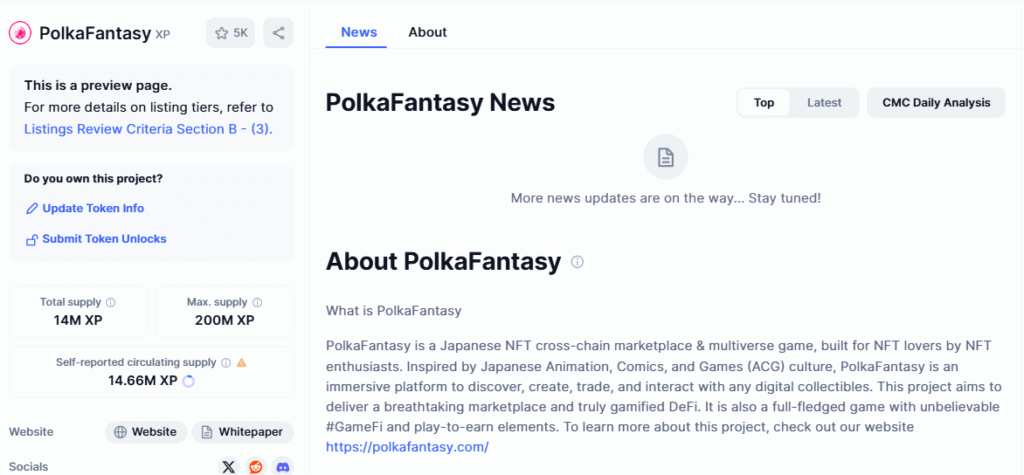
The complexity of the game may alienate newcomers, however—players must grasp character stats, marketplace trading, and intricate battle strategies. Documented starting costs involving the purchase of NFTs or tokens is vague, and lacking community engagement or developer activity raises concerns of a “dead” ecosystem.
Polygon’s low fee subsidies enable its infrastructure, but without verifiable operations or welcoming interfaces for newbies, PolkaFantasy’s positioning on the list becomes dubious. Its unclear prospects and probable absence of user-friendliness detract from the accuracy of the list for novices.
PolkaFantasy Features
- Fantasy card battles: The overarching concept of this game is set out in a fantasy realm, comprising strategic battles fought through cards. Each card will represent NFTs.
- Community-driven – The player base directly impacts any in-game events as well as updates, allowing for an everchanging and dynamic experience.
- Exploration and Mining – Players can traverse various planets and extract resources to increase their earnings.
- NFTs and rewards – You can obtain NFTs corresponding to certain resources, which can be exchanged or sold for cryptocurrency.
- Simple gameplay loop – Send workers on expeditions, gather resources, then sell these resources for in-game tokens.
- Sci-fi setting – The CryptoMines universe is set in the prospective future, which offers an extra layer of immersion for players.
7. CryptoMines
CryptoMines was a sci-fi play-to-earn game on the Polygon. It allowed players to mine resources on virtual planets via NFT workers and spaceships. The game collapsed in late 2021 due to unsustainable tokenomics, rendering it defunct by 2025.
Its inclusion in a list of “best” games for beginners is a significant inaccuracy, as the game is no longer in a playable state. Additionally, the game previously required participation through purchasing NFTs which had extremely volatile spikes in its ETERNAL token.
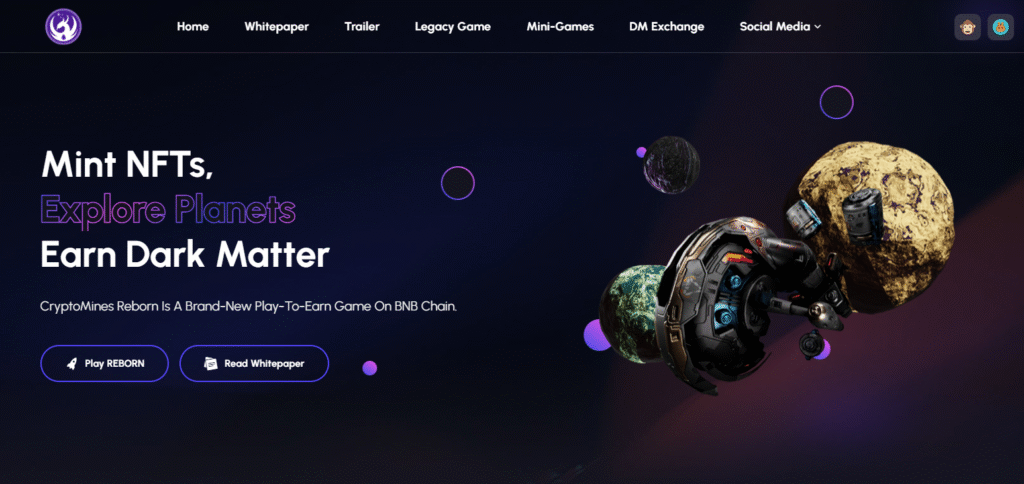
This made it unnecessarily risky, even in its prime. Polygon’s low fees aided its transactions, but the game’s demise underscores the risks surrounding speculative crypto games.
In 2025, the inclusion of CryptoMines was inaccurate and misleading. The game holds no value for any players, beginner or advanced, as it destroys the list’s credibility and relevance.
CryptoMines Features
- Futuristic space setting: Sci-Fi Exploration. Explore the planets and mine resources.
- Collect unique NFT workers and resources: NFT Assets.
- Earn tokens within the game: Play-to-Earn. Sell mined and collected resources.
- Perfect for beginners: Simple Gameplay. Easy-to-understand mechanics.
- For profit: Marketplace. Buy NFT assets as well as sell and trade them.
9. Gods Unchained
Gods Unchained is a free NFT trading card game (previously played on Immutable X) on Polygon, where players collect cards to build decks and compete for rewards. It is easy for beginners as there is no initial payment and players get starter cards to build decks, as well as free tutorials that help them learn basics similar to gameplay of Hearthstone.
Players can earn rewards from winning matches and claiming spots on leaderboards, as well as trading rare cards monetized as NFTs.
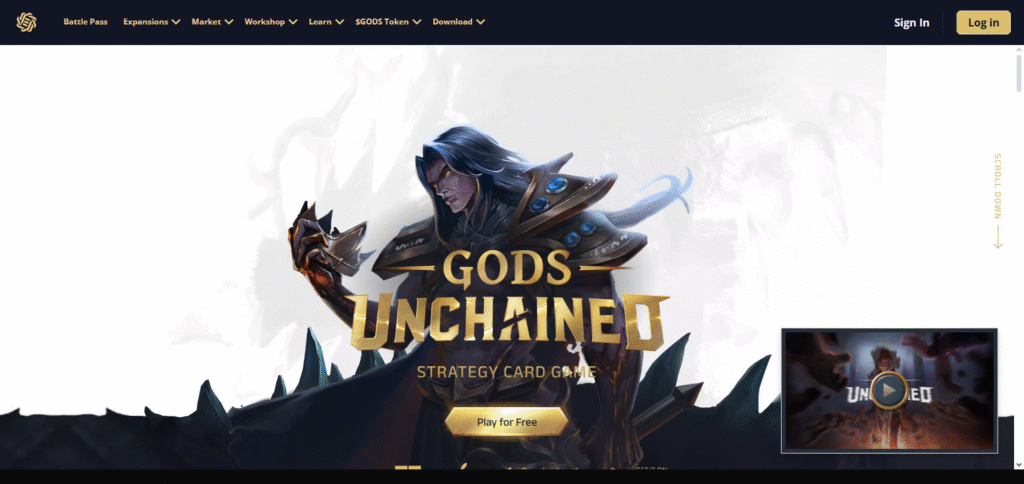
Players can freely trade and craft cards due to Polygon’s low transaction fees, and frequent updates to the game like new card sets planned for 2025, help maintain the interest of the game’s active community.
Gods Unchained is an ideal choice for beginners due to the lack of entry barriers, core gameplay simplicity, availability on Polygon, and is therefore a worthy inclusion on the list.
Gods Unchained Features
- Blockchain-Based Collectible Cards – Gather NFTs of different card assets that can be put into decks and battled.
- Strategic Gameplay – Outthink several opponents and overcome them with tactical deck building and card usage.
- Play-to-Earn – Victory in a tournament or combat can yield various rewards and cryptocurrency.
- Open Marketplace – Player-owned marketplaces allow cards bought or traded, thus earning money through rare cards.
9. Sorare
Sorare is an NFT fantasy sports game specialized in soccer, basketball, and baseball where users build teams by collecting and trading NFT cards of players to compete in tournaments. Dominantly played on Ethereum, some transactions are made on Polygon for cost reduction purposes.
Its ease of entry is intermediate: there are free-to-play options with common tier cards, but highly competitive team formations necessitate acquiring rare cards that often range, from a couple of dollars, to thousands.
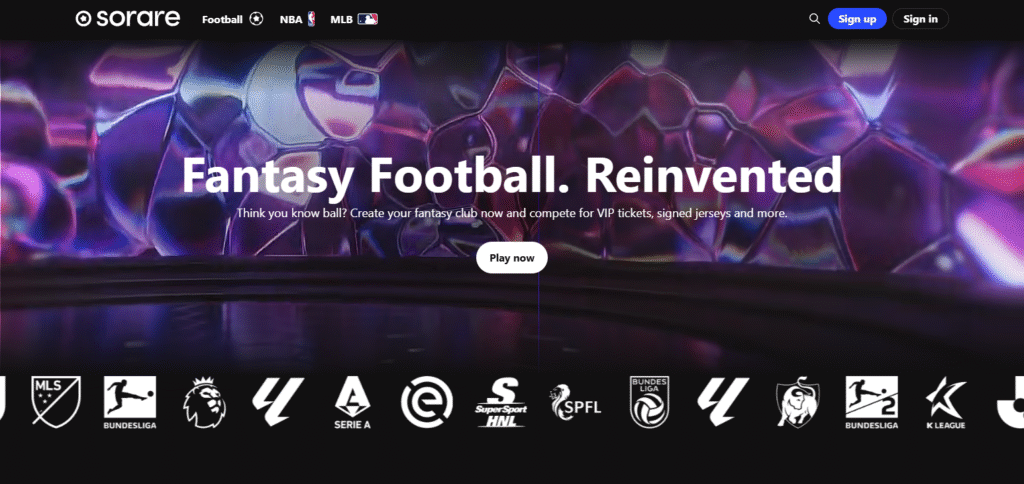
Its main drivers of interest are the sports-based strategic gameplay and the global audience, with revenue opportunities available via tournament awards or trading cards. It has a somewhat misplaced focus on Polygon since its primary function is the maintenance of marketplace transaction on-ramps.
As of 2025 Sorare continues to operate, but due to its investment-optimized structure and Ethereal base, it less suited for beginners than other games focused on Polygon brained features. Its endorsement on this list does afford some merit but compromises precision.
Sorare Features
- Fantasy Football – Create your own fantasy football team using NFT cards of real-life football players.
- Real-world integration – Players get rewarded based on the actual performance of the football players.
- Trading and Tournaments – Compete in global tournaments or trade to earn crypto rewards.
- Low transaction fees with Polygon: Sorare manages to keep fees low for trading and transferring cards because of its implementation of Polygon.
10. The Sandbox
The Sandbox is a voxel-based Metaverse which operates on the Ethereum blockchain and allows players to create, own, monetise, and sell virtual experiences via LAND and SAND tokens.
Polygon is utilized for NFT minting and other transactions to lower fees. Similar to Decentraland, Sandbox struggles with Polygon network integration, as its core operations are Ethereum-based.
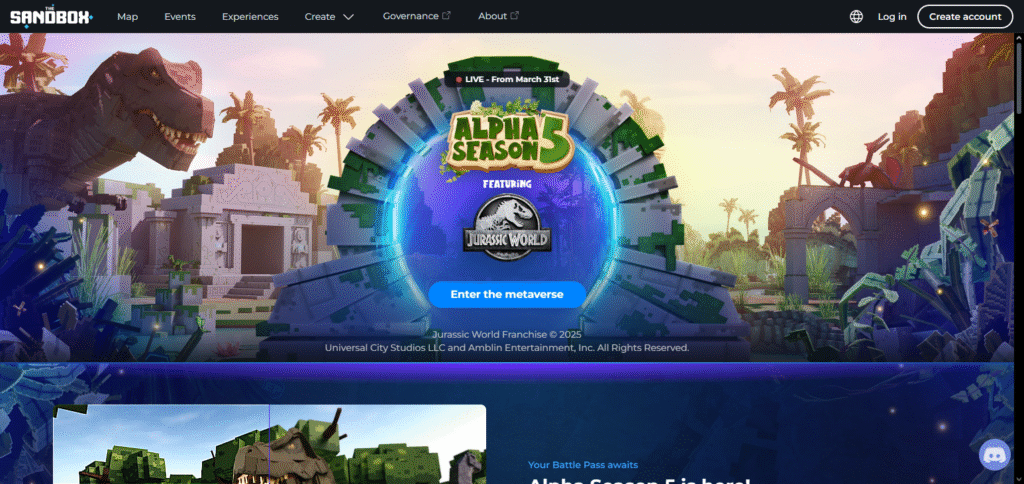
Additionally, The Sandbox is less accessible to beginners due to high entry thresholds. LAND parcel prices are thousands of dollars, and technically creating content necessitates investing in significant assets.
Earning potential in user-created games is limited without ownership. While Polygon’s low transaction fees are beneficial, the game’s complexity and costs make it unfriendly for beginners.
As of 2025, The Sandbox is touted as one of the leaders in the metaverse, but focus on Ethereum coupled with high entry barriers suggests it’s unlikely to feature prominently on a beginner’s list, indicating a potential misalignment.
The Sandbox Features
- User-created content: Users are free to build their own imaginative worlds, games, and avatars.
- Land ownership: Users can purchase virtual land as NFTs and develop them using custom assets.
- Monetization: Users can profit from their custom creations by leasing or selling virtual land and other assets.
- Social interaction: Take part in community events and interact with other users in an immersive metaverse.
Conclusion
To sum up, the top crypto games on Polygon serve as an engaging starting point for novices wanting to try their hand at blockchain gaming.
As emphasized earlier, Aavegotchi, Sunflower Land, and The Sandbox offer easy-to-learn mechanics, low fee structures, and a lot of value through their ‘play-to-earn’ systems which makes the initial experience enjoyable .
No matter if you prefer farming, racing, card battles, or exploring virtual worlds, Polygon has it all.


